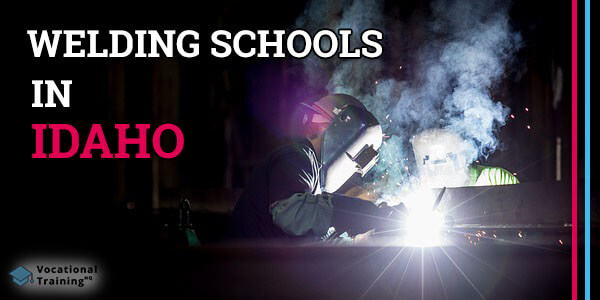If you want to become a professional welder in Idaho, you should know that there are 9 schools that offer welding training programs.
Below, we prepared for you some clue data about these schools.
Also, you can find some other useful info such as facts, tips, salary and so on.
Article Table of Contents
Average Welder’s Salary in Idaho
Of course, before choosing a career, it’s important to understand how much you can earn.
We prepared for you some info about the welder’s income in Idaho:
- An average median salary of a welder in Idaho is $36,340 annually. It’s slightly lower than the median salary throughout the country ($39,390).
- A welder can earn about $17.47 per hour. A median rate throughout the country is about $18.94.
- Top 10% of welders in Idaho earn $49,570 per year.
How to Become a Welder in Idaho: Step-by-Step Guide
You should know that if you want to become a professional welder you need to work hard to achieve your goal.
Nevertheless, it’s worth trying as welding is an absolutely rewarding career.
If you still want to become a welder, you should keep in mind the following steps:
- Start with getting your high-school diploma or GED as most schools require one of these options. Nevertheless, it’s better to doublecheck the info as some schools are ready to accept high-school juniors.
- Look for an appropriate welding training program. You need to make sure that you’ll be able to learn all the necessary skills to pass your welding certification test.
- Get prepared for the welding certification test designed by the American Welding Society.
- After getting your certification, you can start looking for your future career. Consider the fact that most schools normally provide job placement assistance.
- Don’t forget to renew your welding certification once in half a year.
- Don’t lose your chance to get a higher salary. You can gain a better career option if you decide to improve your skills and continue your education. You may enter some training programs to get a Senior Certified Welding Inspector certification or underwater welding certification.
Top 9 Welding Certification Schools in Idaho
Here you can find a table that contains data of the best welding certification schools in Idaho.
Each school provides such classes as Gas Tungsten Arc Welding (TIG), Shielded Metal Arc Welding (Stick), Gas Metal Arc Welding (MIG), and others.
| School | Location | Contact Information | Phone Number |
|---|---|---|---|
| Centennial Job Corps | 3201 Ridgecrest Dr. Nampa, ID 83687 United States | Kris Johnson | (208) 442-4500 |
| College Of Southern Idaho | 315 Falls Ave. Desert BLDG Twin Falls, ID 83303 United States | Hank Bauman | (208) 732-6795 |
| College Of Western Idaho | 1464 University Dr. Boise, ID 83706 United States | Pat Neal | (208) 562-2345 |
| Dehryl A. Dennis Technical Center | 8201 W. Victory Rd. Boise, ID 83709 United States | Jim McKenzie | (208) 854-5810 |
| Lewis-Clark State College | 500 8th Ave. Lewiston, ID 83501 United States | Dan Huffman | (208) 792-2210 |
| Meridian High School | 1900 W. Pine Ave. Meridian, ID 83642 United States | Steve Wilder | (208) 350-4160 |
| North Idaho College | 1000 W Garden Ave. Coeur D Alene, ID 83814 United States | Dr. Barbara Bennett | (208) 769-3311 |
| Technical Careers High School | 3497 N. Ammon Rd. Idaho Falls, ID 83401 United States | Brad Huntsman | (208) 525-4434 |
| Twin River Valley High School | 201 Main Ave W. Twin Falls, ID 83301 United States | Roger Golden | (208) 733-6900 |
Keep in mind that the information in the table may change so we recommend you to doublecheck it.
Popular Degree Programs
Where Can Certified Welders Work in Idaho?
After getting your certification in Idaho you’ll be able to find a number of career options in such industries as:
- Construction of buildings and bridges;
- Manufacturing;
- Aerospace applications;
- Gas & oil field power plants and refineries;
- Shipbuilding;
- Auto & motorcycle fabrication and repair.
Conclusion
We’ve done our best to prepare this info for you and now it’s your turn!
Make your choice and work hard to achieve your goal!
Frequently Asked Questions
How do I use an ARC welder?
Arc welding is another term for stick welding.
This process entails using an electric arc to create the needed amount of heat to melt and join weld metals.
An electric current runs through the electrode, melting it and forming a weld pool.
The layer of flux covering the electrode melts and ensures the weld pool does not get contaminated by the elements.
The flux creates a layer of slag on the weld bead.
This layer needs to be chipped and brushed off when the weld is complete.
What are the 4 main types of welding?
The four main types of welding are MIG (gas metal arc welding), TIG (gas tungsten arc welding), stick welding, and flux-core arc welding.
The welding technique that is used depends on a number of factors, including the types of metals being welded, metal thickness, and the industry being served.
What is a Level 1 welder?
A Level 1 welder, who fabricates, joins, and repairs metals and other weldable materials, typically have 1-3 years of experience in the field.
Otherwise, they have an associate’s degree, an additional amount of training, or some sort of welding certification.
This person, who has become proficient in a specific area in welding, works under a moderate amount of supervision.
Read the full guide: How to Become a Certified Welder
